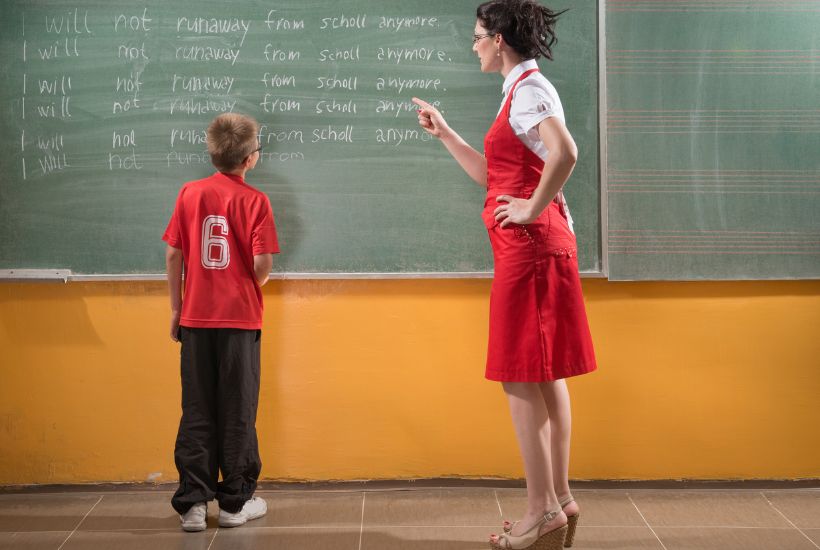What to do when a Child Doesn’t Care About Consequences
It can be very frustrating for parents when a child doesn’t care about the consequences.
It seems they are not listening or understanding the importance of following through with what we ask them to do.
As parents, we want our children to understand that there are consequences for their actions, but sometimes it’s challenging to get them to listen.
In this blog post, we will explore why children might not care about the consequences and offer tips on setting the right kind of consequence and getting your child to listen.
Do They Really Not Care?
When a child doesn’t care about the consequences, it may seem like they are not listening or understanding.
However, there could be several reasons a child doesn’t appear to care about the consequences of their actions.
For example, they may not fully understand the consequence, or they may not believe that the consequence will actually happen.
Sometimes, a child may be testing boundaries to see what they can get away with.
It’s important to remember that just because a child doesn’t care about the consequences doesn’t mean they are bad.
There are several reasons a child might not care about the consequences, and it’s important to understand the cause before taking action.

Reasons why a child doesn’t care about consequences:
- They don’t fully understand the consequence
- They don’t believe that the consequence will actually happen
- They are learning about the world and testing boundaries
- They have a negative self-image
- The child is in the angry tunnel
What to do when your child doesn’t care about consequences?
If you’ve determined that your child doesn’t care about the consequences, there are some things you can do to change the situation.
Set Clear and specific consequences
When setting a consequence, it’s essential to be clear and specific about what will happen if the child doesn’t follow through.
If the child doesn’t understand the consequence, they are less likely to care about it.
Make sure the child knows exactly what will happen if they don’t follow through with what you’ve asked them to do.
For example, if you tell your child they didn’t clean their room, they will have to live in a mess.
This is a specific consequence your child can understand and believe will happen.
Make sure the consequence is age-appropriate
The consequence should also be appropriate for the child’s age.
If the consequence is too severe, the child may not be able to follow through with it, and they will start to resent you.
For example, you shouldn’t publish a 10-month-old child for biting by putting them in a time-out as children this age don’t understand the idea of consequence (Cause and effect)
On the other hand, if the consequence is not severe enough, the child may not see the point in following through with what you’ve asked them to do.
For example, if a 10-month-old child starts biting, you shouldn’t ignore it. In fact, you should change your tone of voice (not shout) to show hurt.
The consequence has to fit the crime.
The consequence should also be proportional to the child’s actions.
If the child does something minor, the consequence should also be minor.
For example, if a child doesn’t clean up their toys, you shouldn’t take away all their toys or take away the trip to the zoo.
This is not proportional and will only serve to frustrate the child.
A better consequence would be to have the child clean up their toys, and then they can choose one toy to play with for the rest of the day.
This is a more positive consequence proportional to the child’s actions.
Is it a consequence or a punishment?
It’s important to understand the difference between a consequence and a punishment.
A consequence is an action’s natural or logical result, while punishment is the intentional infliction of pain or suffering in response to an action.
For example, if a child doesn’t clean their room, a consequence would be that they have to live in a mess.
A punishment would be if the child was spanked or put in a time-out.
It’s important to note that punishments are ineffective in teaching children about the consequences of their actions.
In fact, they can actually make the situation worse by causing resentment and anger.
Make sure that the consequence teaches them something.
Punishment is a controlling tactic, while a consequence is a teaching tactic.
When setting a consequence, make sure that it’s something that will teach the child about what they did wrong and how to fix it.
For example, if a child doesn’t clean their room, you can have them help you clean up as a way to teach them about responsibility.
This is a more positive consequence that will help the child learn from their mistake.
Start with a small consequence to set them up for success.
If you’re unsure what kind of consequence to set, it’s best to start with a small one.
For example, if a child doesn’t clean their room, you can start by having them clean up for 15 minutes daily.
This is a manageable consequence that the child can actually follow through with.
As they start to succeed with this small consequence, they feel that they are capable.
A child who feels that they can’t do something is less likely to try.
Make sure it’s not affecting their self-worth.
When setting a consequence, make sure that it’s not something that will affect the child’s self-worth.
For example, if a child doesn’t clean their room, you shouldn’t tell them that they are a bad person.
This will only damage their self-esteem and make them feel worse about themselves.
How do you set the right kind of consequence?
Now that you know the difference between a consequence and a punishment, it’s important to set the right kind of consequence.
When setting a consequence, make sure it is:
- Clear and specific
- Age-appropriate
- The logical or natural result of the child’s action
- Proportional to the child’s action
- Teachers the child about their mistake
- manageable for the child to follow through with
- Not something that will affect the child’s self-worth
If you keep these things in mind, you’ll be well on setting the right kind of consequence.
What influences your child the most?
- Logical and Natural consequences
- Teaching your child how to think
- Give them time and grace
- Letting your child choose the consequence
- Aiming for solutions rather than consequences
- Focusing on values and skills rather than personal blame
- Connecting and repairing the relationship
- Using intrinsic motivation
- Teaching your child about discipline
1) Logical and Natural consequences
If your child doesn’t care about the consequences of their actions, it’s important to use logical and natural consequences.
This is different than punishment, which can actually make things worse.
With logical and natural consequences, the child learns from their mistake and understands how their actions have affected others. This can help them listen and care in the future.
Logical consequences are planned out ahead of time, while natural consequences are the results of the child’s actions.
For example, if a child doesn’t clean their room, a logical consequence might be that they have to clean it for a certain amount of time. Likewise, a natural consequence would be that the room becomes messy and cluttered.
It’s important to note that while punishments are ineffective in teaching children about the consequences of their actions, logical and natural consequences are.
This is because they help the child learn from their mistake and understand how their actions have affected others.

Some examples of logical consequences include:
- Having to complete a given task or chore by a specific time
- Not being able to participate in an activity or event
- Losing privileges or rewards
- Removal of a favorite toy or object
Some examples of natural consequences include:
- Not being able to find something because it’s cluttered
- Having to clean up a mess that was created
- Feeling tired after not getting enough sleep
- Being hungry after skipping meals
- Becoming sick or injured as a result of not taking care of oneself
- Problems with schoolwork or getting poor grades
2) Teaching your child how to think
If your child doesn’t care about the consequences of their actions, it’s important to teach them how to think.
This is because if they can understand how their actions have affected others, they are more likely to care in the future.
One way to do this is to ask them questions after they have done something wrong.
For example, you could ask: “How do you think that made your sister feel when you hit her?” or “What would you have wanted someone to do if they did that to you?”
Another way to teach your child how to think is by using books or stories.
You can read a book together and discuss the characters’ actions and why they were good or bad.
You can also use stories to teach your child about the consequences of their actions.
For example, you could tell them a story about a child who didn’t listen to their parents and ended up getting lost.
This would help them understand that if they don’t listen to their parents, they could end up in a dangerous situation.
3) Give them time and grace.
When a child doesn’t care about the consequences of their actions, giving them time and grace is important.
This is because they may not be able to understand the consequences of their actions right away.
It’s important to give them time to process what happened and why it was wrong.
You can also offer grace by forgiving them and helping them understand that everyone makes mistakes.
This will help them feel better about themselves and be more likely to care in the future.
But be careful not to be lenient if their actions hurt them or someone else or don’t go with the home values.
4) Let your child choose the consequence.
In some cases, letting your child choose the consequence may be helpful.
This is because they are more likely to care about the consequence if they have chosen it themselves.
For example, ask them, “what do you think you’re consequence should be?”
You can also let them choose the consequences of their actions by giving them a list of options.
This will help them understand that there are different consequences for different actions and that they need to think about what they did before choosing a consequence.
5) Aiming for solutions rather than consequences
It’s important to remember that the goal is to teach your child about the consequences of their actions, not to punish them.
This means that you should focus on finding solutions rather than consequences.
For example, you can try to find solutions that will help your child in the future, such as teaching them how to organize their belongings or setting up a schedule for cleaning their room.
Remember that every child is different.

6) Focusing on values and skills rather than personal blame
When a child makes a mistake or has an attitude, remember what values and skills you want them to learn.
For example, if your child isn’t doing their homework, focus on what you want to teach about taking responsibility, initiation, and time management.
So instead of blaming by saying things like “You’re so lazy! You never do your homework!” you could say, “I know that you’re capable of doing your homework; let’s sit down and figure out a plan so that you can get it done.”
This will help your child feel good about themselves and be more likely to care in the future.
7) Connect and repair the relationship
It’s important to remember that your relationship with your child is more important than the consequences of their actions.
This means you should focus on repairing the relationship after they have done something wrong.
For example, you could say, “I’m sorry that I got so angry at you. Can we talk about what happened?” or “I know you’re sorry for what you did, let’s hug it out.”
This will help your child feel loved and supported, even when they make mistakes.
It will also help them feel more connected to you and be more likely to listen to you in the future.

8) Use intrinsic motivation
Intrinsic motivation is when someone is motivated to do something because they enjoy it or because it’s important to them.
For example, you could say, “I know that you don’t like cleaning your room, but it’s important to keep our home tidy.”
You could also find ways to make the task more enjoyable, such as playing music or making it into a game.
It’s important to remember that intrinsic motivation is more effective in the long run than extrinsic motivation when someone is motivated by external factors such as rewards or punishments.
Extrinsic motivation can be helpful in the short term, but it’s not as effective in the long term because it doesn’t teach children to care about the task.
It’s also important to avoid using threats or bribes, which are forms of extrinsic motivation.
This is because they can damage your relationship with your child and make them less likely to listen to you in the future.
9) Teach your child how to be disciplined
One of the best things you can do for your child is to teach them how to be disciplined.
This means teaching them how to control their emotions and impulses, set goals, and stick to a plan.
It’s important to remember that discipline is a lifelong process, so it’s never too early to start teaching your child about it.
There are many different ways to teach discipline, but one of the best things you can do is lead by example.
This means that you should be disciplined in your own life and show your child how it’s done.
You can also try using positive reinforcement when praising your child for displaying disciplined behavior.
Discipline is when you do something continuously, even if it doesn’t necessarily bring you joy at the moment.
It’s a habit that you develop over time, and it’s something that will benefit your child greatly in the future.
Conclusion
If your child doesn’t care about the consequences of their actions, it’s important to use logical and natural consequences.
This is different than punishment, which can actually make things worse.
With logical and natural consequences, the child learns from their mistake and understands how their actions have affected others.
This can help them listen and care in the future. You can also teach your child how to think by asking questions or using stories.
Finally, it’s important to give them time and grace. This is because they may not be able to understand the consequences of their actions right away.
I hope this article has helped you understand what you can do if your child doesn’t care about the consequences of their actions.
Remember that every child is different, so it’s important to find what works best for your child.
And always remember that your relationship with your child is more important than the consequences of their actions. Thanks for reading!
If you want to learn more about parenting and its science, subscribe to my newsletter. I hope you have a great day!







